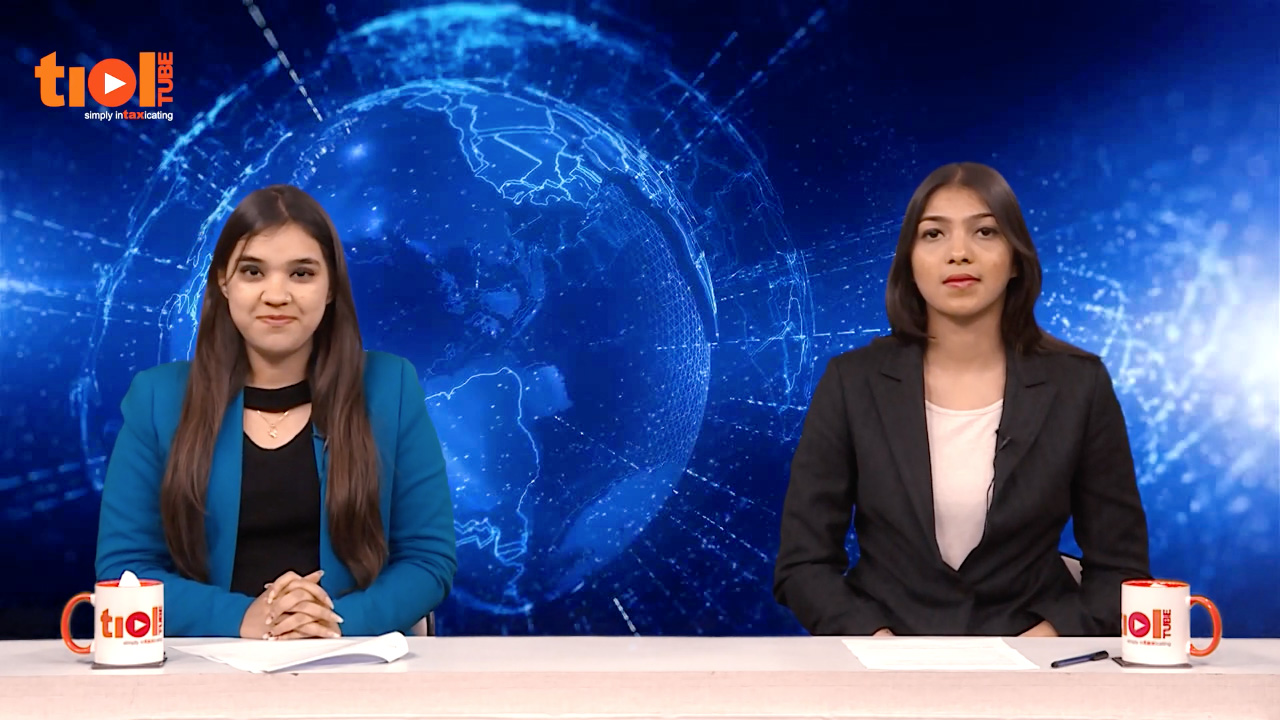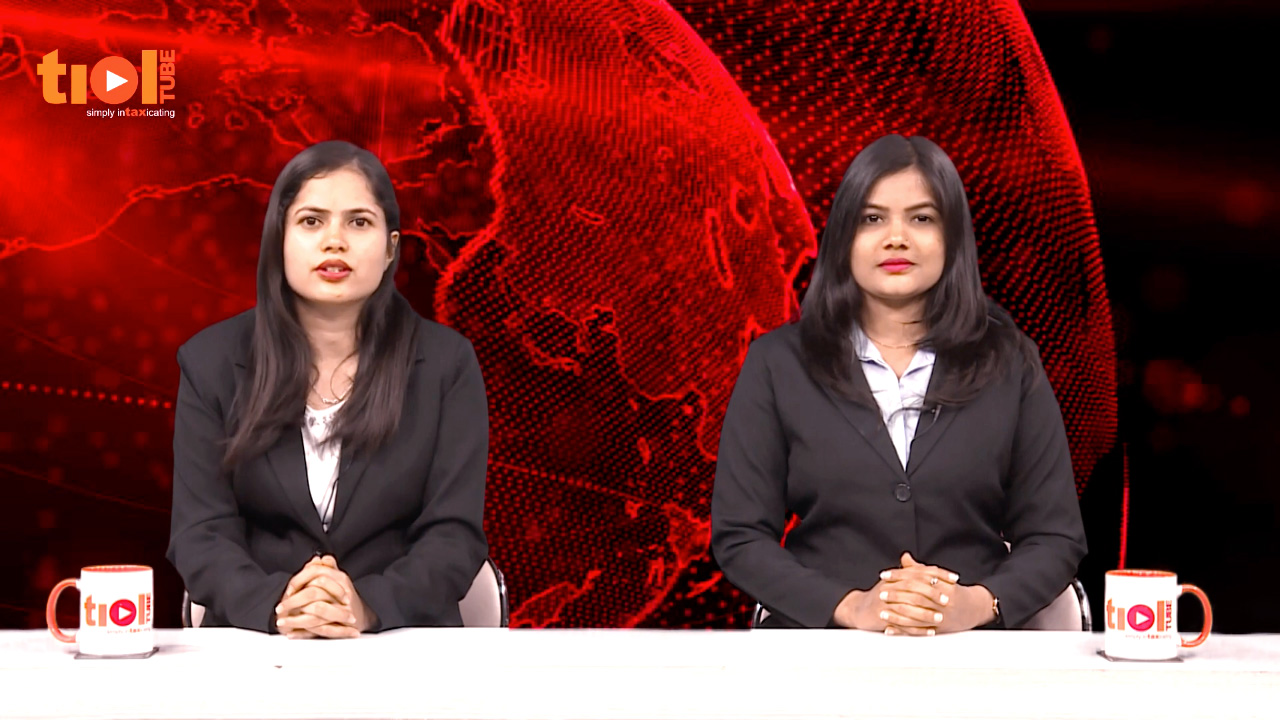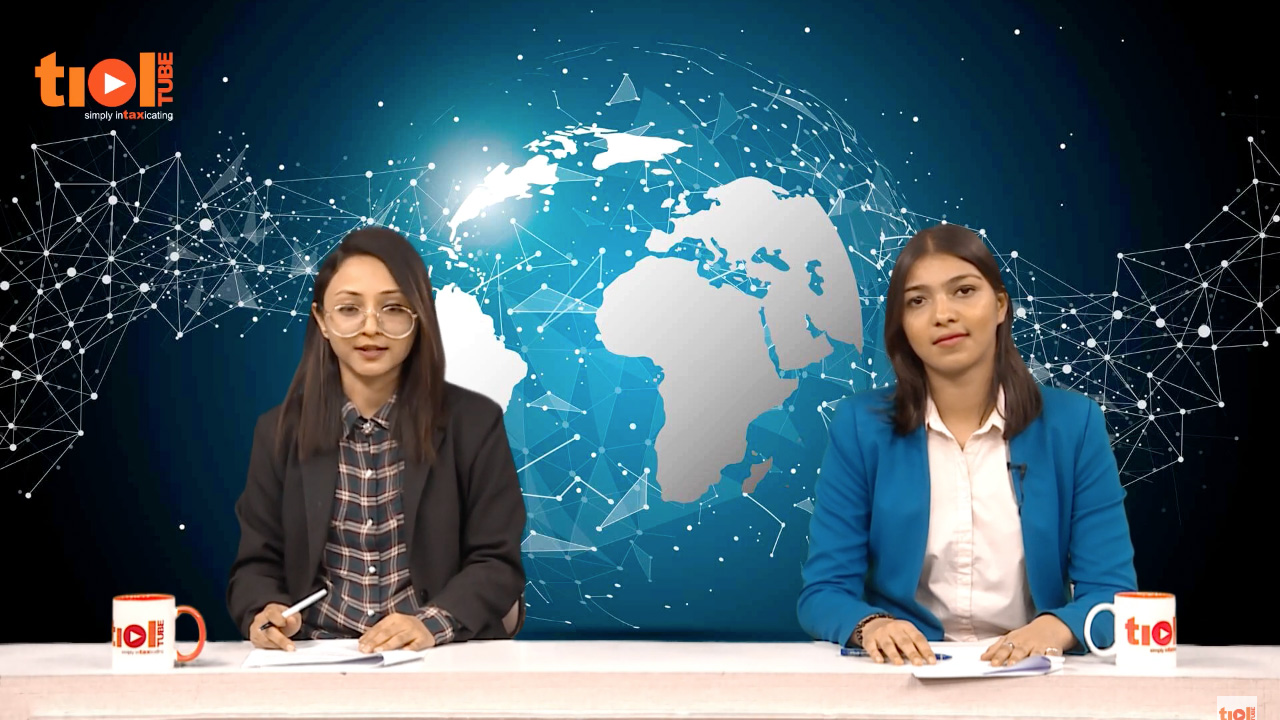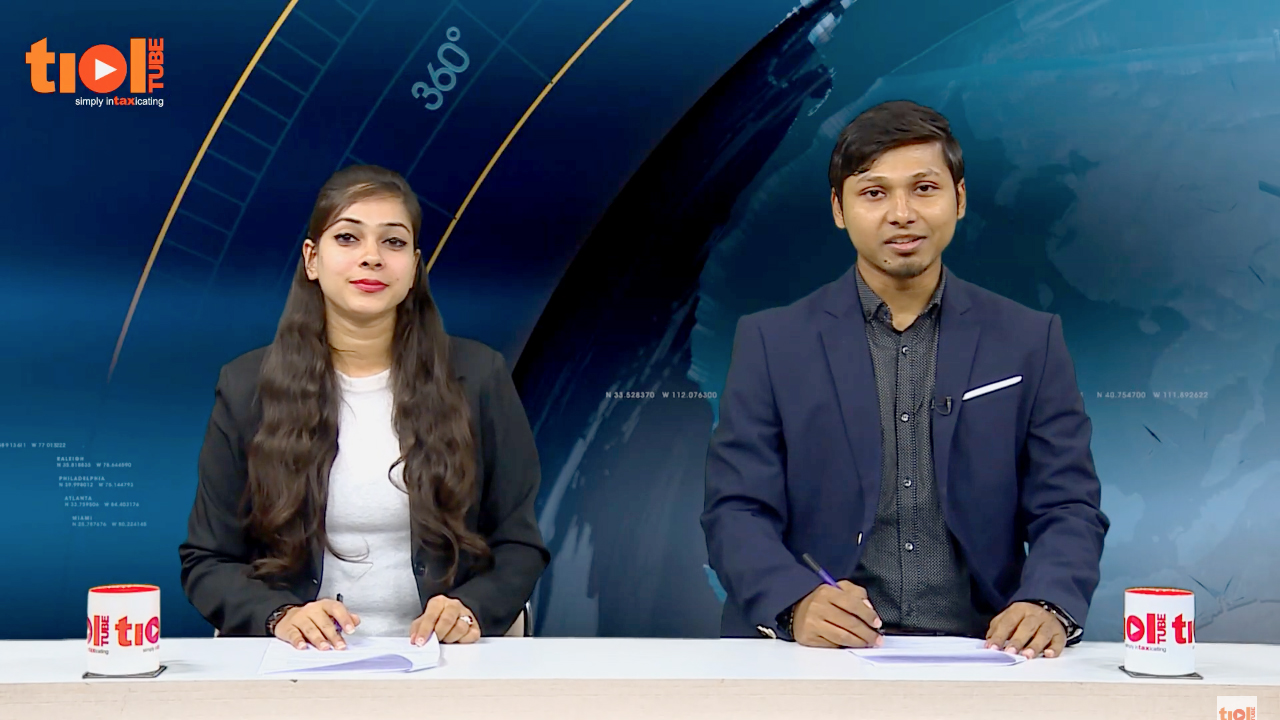 |
 |
2020-TIOL-NEWS-003 | Friday January 03, 2020 |
 |
 |
Dear Member,
Sending following links. Warm Regards,
TIOL Content Team
TIOL PRIVATE LIMITED.
For assistance please call us at + 91 850 600 0282 or email us at helpdesk@tiol.in. |
 |
|
 |
 |
 |
TIOL TUBE VIDEO |
 |
|
 |
DIRECT TAX |
 |
|
 |
 |
 |
 |
 |
 |
 |
|
2020-TIOL-14-HC-MAD-IT PR CIT Vs Saravana Selvarathnam Retail Pvt Ltd
Having heard the parties, the High Court held that since the tax effect is less than Rs 1 crore, the appeal filed by the Revenue is dismissed.
- Revenue's appeal dismissed: MADRAS HIGH COURT
2020-TIOL-13-HC-MAD-IT
CIT Vs Seven Seas Distillery Pvt Ltd
Whether if the benefit from deduction of TDS on interest payment made on foreign currency loan has been granted by the Finance Minsitry, the indirect utilisation of such loan to repay an earlier working capital loan will not attract the disabling prvisions of section 40(a) - YES: HC
- Revenue's appeal dismissed: MADRAS HIGH COURT
2020-TIOL-12-HC-KAR-IT
Mysore Palace Board Vs CBDT
Whether if the activity of Special Board constituted for acquisition of Mysore Palace remains unchanged from the preceding AYs, prospective benefit of exemption u/s 10(46) can be notified retrospectively - YES: HC
- Assessee's writ petition allowed: KARNATAKA HIGH COURT
2020-TIOL-11-HC-KAR-IT
B Kunhi Ahmed Vs PR CIT
Whether the assessee can exercise the remedy of writ to condone the delay where the Tribunal has dismissed the appeal as time barred - YES: HC
- Assessee's petition partly allowed: KARNATAKA HIGH COURT
2020-TIOL-15-ITAT-MAD
IP Softcom (India) Pvt Ltd Vs DCIT
Whether power to refuse additional evidence u/r 46A can be relaxed, when substantial justice is pitted against technicalities - YES: ITAT
- Case remanded: CHENNAI ITAT
|
|
|
 |
   |
 |
|
 |
 |
MISC CASE |
 |
|
|
 |
 |
GST CASE |
 |
|
 |
 |
 |
 |
 |
 |
 |
|
2020-TIOL-02-NAA-GST
Director General of Anti-profiteering Vs Acme Housing India Pvt Ltd
GST - Anti-Profiteering - s.171 of the CGST Act, 2017 - Applicant has alleged profiteering by the respondent in the matter of purchase of flat in the respondent's project ‘Acme Ozone Herbelia' - Inasmuch as the applicant alleges that the respondent had not passed on the benefit of Input Tax credit by way of commensurate reduction in price w.e.f 01.07.2017 - DGAP in its report concluded that the ITC as a percentage of the turnover that was available to the respondent during the pre-GST period was 1.05% and during the post-GST period was 3.66% and which showed that the respondent had benefited from additional Input Tax credit to the tune of 2.61% of his turnover - accordingly, the DGAP computed the profiteering made by the respondent during the period July 2017 to 31st December 2018 as Rs.2,10,57,462/- which included the GST component of 12% i.e the base profiteered amount is Rs.1,88,01,305/- and the benefit to be passed on to the applicant was Rs.1,91,662/- - DGAP informed that the respondent had already passed on Rs.3,11,726/- to the applicant vide letter dated 27.04.2018 and so the extra benefit passed on to the applicant can be adjusted against the demand to be raised on the applicant or the benefit of ITC can be passed on to him for the post December 2018 period - insofar as other buyers are concerned, the DGAP observed that no evidence has been produced by the respondent that they have passed on similar benefits - the computation of profiteering has been done by DGAP in respect of 152 home buyers from whom payments have been received by the respondents during the post GST period; that the respondent has sold a total number of 176 flats till 31.12.2018 but in respect of 24 flats the customers have not paid any consideration during the impugned period.
Held: Perusal of the letter of the respondent addressed to the DGAP in the matter of passing of ITC benefit of Rs.3,11,726/- reveals that this amount has been paid as a discount/rebate and which cannot be taken to be the benefit of ITC and hence no excess benefit of ITC has been passed on to the said buyer (applicant) - respondent has reiterated that they had passed on the ITC benefit of 3.16% to all the customers who have booked flats before 01.07.2017 - however, the respondent has not produced any reliable or cogent evidence either before the DGAP or the Authority in support of their contention that they had passed on the benefit of ITC by submitting the details of entries made in their books of account or cheques issued to the buyers or the copies of the tax invoices/demand letters or the acknowledgements made by their customers of having received the benefit of ITC due to implementation of GST - Granting of rebates/discounts is the most prevalent practice followed in the construction industry to increase sales and hence the said rebate/discount cannot be equated with passing on of the benefit of ITC - respondent has only claimed to have passed on the discount/rebate on account of GST which cannot amount to passing on the benefit of ITC as per the provisions of s.171(1) of the CGST Act, 2017, therefore, the claim of the respondent is frivolous and cannot be accepted - therefore, the applicant is also entitled to an amount of Rs.1,91,662/- (including GST) as benefit of ITC along with interest @18% - so also, the amount of profiteering of Rs.2,08,65,800/- arrived at by the DGAP is required to be returned to the eligible buyers along with interest - DGAP is directed to investigate the issue of passing on the benefit of additional ITC by the respondent in respect of the whole project ‘Acme Ozone' and also other projects being undertaken under the said RERA registration and submit his report in terms of s.171(2) of the Act read with rule 133(5) of the Rules - Commissioners of CGST/SGST, Maharashtra to monitor this order under supervision of DGAP by ensuring that the amount profiteered is passed on to all eligible buyers and a compliance report to be submitted within four months - SCN to be issued for imposition of penalty prescribed u/s 171(3A) of the Act r/w rules 133(3)(d) of the CGST Rules, 2017: NAA
- Application allowed :NATIONAL ANTI-PROFITEERING AUTHORITY
|
|
|
 |
   |
 |
|
 |
 |
INDIRECT TAX |
 |
|
 |
 |
 |
 |
 |
 |
 |
|
SERVICE TAX
2020-TIOL-16-CESTAT-DEL
OM Logistics Ltd Vs CCGST
ST - The assessee-company is registered with the Department for provisions of Courier Agency service & BAS and regularly discharged service tax liability and filed ST-3 returns - During the relevant period, the assessee availed credit of the expenses incurred in respect of the Keyman Insurance Policy of of the Key Managerial Persons - In the instant case, the Keyman Insurance Policy pertaining to Shri Anil Singhal, who has Managing Director of the appellant, upon his life - The appellant took Keyman Insurance Policies from HDFC life, Kotak Life Insurance - The Revenue opined that the life insurance policy of the keyman person is primarily for personal use and not for business purpose - Hence SCN was issued, proposing reversal of credit on insurance policy under the provisions of Section 73(1) of the Act r/w Section 14 of CCR along with interest u/s 75 and penalty u/s 78 r/w Rule 15 of CCR 2004 - On adjudication, the demand was confirmed and later sustained by the Commr.(A) - Hence the present appeal.
Held - The issue of availability of credit on insurance policy was decided by this Tribunal in favour of the assessee in its own case in Service Tax Appeal No. 52845 of 2018-SM - It was held therein that in the policy documents, that the benefit under the policy in question is payable to the policy holder, i.e., the ssessee-company - Also, nomination is generally required to get benefit of the policy. Where the policy holder is a company under the Companies Act in such cases, no nomination is required - In light of the such findings, the O-i-A merits being quashed: CESTAT
- Assessee's appeal allowed: DELHI CESTAT
2020-TIOL-15-CESTAT-MAD
Novotron Broadband Pvt Ltd Vs CGST & ST
ST - The assessee-company provided service of maintenance of set top boxes on the basis of agreement entered into by them - The assessee paid service tax on the service component and paid sales tax on the material component - However, the Department opined that being composite contract, the entire value including material component had to be taken for the purpose of determining the taxable value of services and that service tax had to be paid on such value upto 30.06.2012 - It was also stated that w.e.f. the activity would be treated as WCS and 70% of the composite value is to be considered for payment of service tax - SCN was issued raising demand for diffential amount of duty - Such demands were confirmed on adjudication and equivalent penalty was imposed - On appeal, the Commr.(A) sustained such findings.
Held - The issue at hand pertains to demand of differential service tax on the value obtained is including value of the materials used in rendering Repairs and Maintenance Service - In this regard, the Apex Court in Safety Retreading Co. (P) Ltd., Vs Commissioner of Central Excise held that the spare parts/materials used for repairs and maintenance cannot be said to have been not sold to the customers. In any annual maintenance contract, the spare parts etc., which have been used in the course of maintenance service are definitely considered to be sold and when sales tax has been paid on the value of such goods, simultaneously, one cannot charge them to service tax - In the present case, VAT has been paid on the value of materials - Hence the demands raised are unsustainable: CESTAT
- Assessee's appeal allowed: CHENNAI CESTAT
CENTRAL EXCISE
2020-TIOL-14-CESTAT-KOL
Mccpta India Corporation Pvt Ltd Vs CCGST & CE
CX - The issue in dispute is regarding availment of Cenvat Credit on Furnace Oil consumed for generation of electricity, a part of which was not used in or in relation to manufacture of their final product - SCN was issued for disallowance of Cenvat Credit and recovery of the same - In the assessee's own case for period from July 2014 to August 2015, there was a similar disallowance of Rs.7,49,876/- on such portion of Furnace Oil consumed for generation of electricity which was not used in or in relation to manufacture of final products - The Commissioner(A) has discussed the entire issue in details and finally concluded that the assessee had rightly availed Cenvat Credit on Furnace Oil used in generation of electricity in a captive power generating machine even though a part of such generated electricity is used in factory office and workers' canteen - Since the period covered in appellate order is after the installation of electricity connection i.e. April and June 2015, the facts are no different in the present appeal - Here, it would be pertinent to mention that the SCN alleges consumption of Furnace Oil whereas the assessee have tried to convince the authorities below that after installation of electricity there was no occasion for them to continue with the old system and they had stopped using any Furnace Oil for generation of electricity for smooth running of their manufacturing facility - Tribunal need not go into the allegation and counter allegation and the facts of the SCN and the impugned orders are identical and have been elaborately dealt with by Commissioner(A) - No justifiable reason found for Commissioner (A) to hold an altogether different view in impugned order and therefore the same is set aside: CESTAT
- Appeal allowed: KOLKATA CESTAT
2020-TIOL-13-CESTAT-CHD
Sobti Concast Inc Vs CCE & ST
CX - This appeal has been filed by assessee against confirmation of demand of duty and imposition of penalty under Rule 8(3A) of CER, 2002 - The issue regarding demand of duty and imposition of penalty invoking Rule 8(3A) of CER, 2002 has been decided by High Court of Gujarat as well as High Court of Delhi - The High Court of Gujarat in case of Indus Global Ltd - 2014-TIOL-2115-HC-AHM-CX has declared the said rule ultra-vires - The said order has been seen by Apex Court, however, in terms of the decision of High Court of Delhi in case of Space Telelink Ltd, the decision of High Court of Gujarat in case of Indus Global Ltd is binding - The aforesaid demand and interest is set aside - However, the penalty imposed is reduced to Rs. 5000/-only under Rule 27 of CER, 2002: CESTAT
- Appeal partly allowed: CHANDIGARH CESTAT
CUSTOMS
2020-TIOL-12-CESTAT-HYD
Aurobindo Pharma Ltd Vs CC
Cus - Overseas buyer, Aurobindo Pharma USA Inc, had sent bulk drugs/formulations for repacking - appellant had claimed exemption from Customs duties under notification 52/2003-Cus - department observed that as per the aforesaid notification, goods are exempted when re-imported within three years from the date of exportation for 'repair' or 're-conditioning', however, since the goods in the present case were reimported for the purpose of repacking, the Department argued that the exemption under the said notification has been wrongly availed and hence the appropriate customs duty was proposed to be recovered from the appellants - demand confirmed and the said order was upheld by the Commissioner(A) - importer in appeal before CESTAT.
Held: Key question is whether the activity of repacking of pharmaceuticals can be called as repair or reconditioning - The notification No. 52/2003-Cus nowhere defines the word 'repair' or 'reconditioning' - Reconditioning also is more or less synonymous with the word 'repair' - Chapter Note 6 to Chapter 30 clarifies that while dealing the pharmaceutical products, re-labelling or re-labelling of the containers intended for consumers or repacking from bulk packs to retail boxes or adopting of any other treatment to render the product marketable to the consumer, shall amount to 'manufacture' - Section 2(f) of the Central Excise Act, 1944 as well as Chapter Note 6 to Chapter 30 of Central Excise Tariff make it abundantly clear that repacking of pharmaceuticals amounts to manufacture - Any activity which gets squarely covered under the definition of 'manufacture' cannot be called as "repair or reconditioning" of the products - Sl. No. 14 of Annexure-I to the impugned notification exempts the products/goods imported within 3 years from the date of exportation only under the condition that the goods are re-imported either for repair or for reconditioning, hence when the goods are reimported for an activity which amounts to manufacture, such re-importation will not fall under the impugned notification - Exemption benefit under the notification 52/2003-Cus cannot be extended to the appellant - no infirmity in the impugned order, hence same is upheld and appeal is rejected: CESTAT [para 5, 7, 10, 11]
- Appeal rejected: HYDERABAD CESTAT
|
|
|
 |
   |
 |
|
|
|
 |
|
 |
 |
TIOL PRIVATE LIMITED.
TIOL HOUSE, 490, Udyog Vihar, Phase - V,
Gurgaon, Haryana - 122001, INDIA
Board :
+91 124-6427300
Fax: + 91 124-6427310
Web: https://taxindiaonline.com
Email: updates@tiol.in
__________________________________
CONFIDENTIALITY/PROPRIETARY NOTE.
The Document accompanying this electronic transmission contains information from TIOL PRIVATE LIMITED., which is confidential, proprietary or copyrighted and is intended solely for the use of the individual or entity named on this transmission. If you are not the intended recipient, you are notified that disclosing, copying, distributing or taking any action in reliance on the contents of this information is strictly prohibited. This prohibition includes, without limitation, displaying this transmission or any portion thereof, on any public bulletin board. If you are not the intended recipient of this document, please return this document to TIOL PRIVATE LIMITED. immediately |
 |
|
 |









